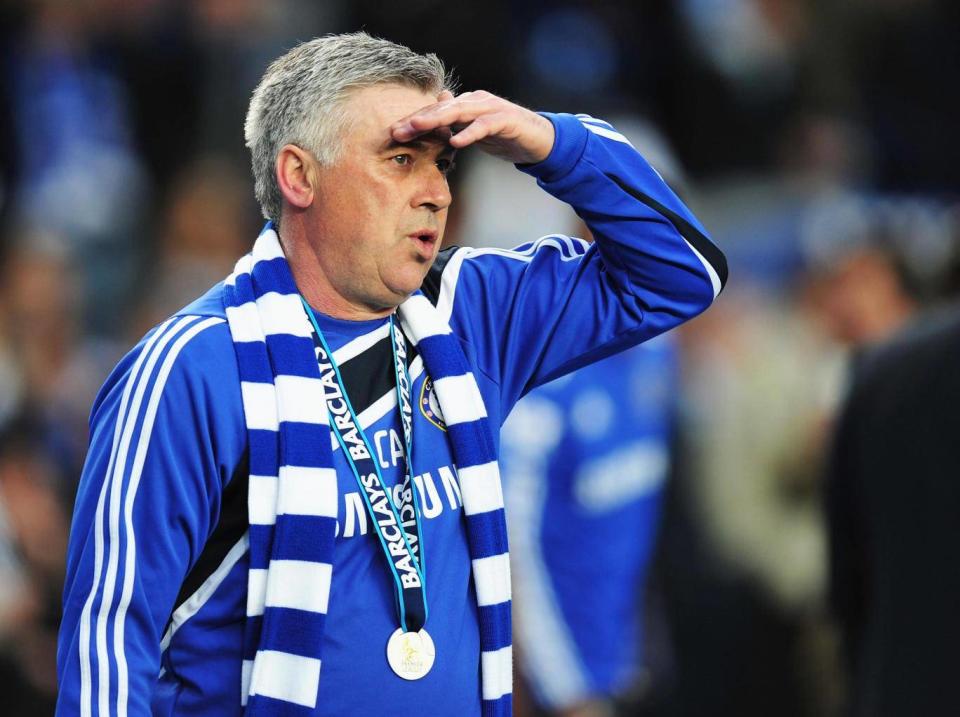Roman Abramovich's Chelsea project has been put in the shade by Manchester City's millions
Fifteen years ago today, Roman Abramovich was sitting in the stands at Old Trafford, transfixed. That was the night Manchester United beat Real Madrid 4-3 in the Champions League, and as the likes of Ronaldo, Giggs, Figo, Zidane, Veron and Roberto Carlos served up a feast of mesmerising attacking football, a vision began to crystallise in Abramovich’s mind: of owning a football team that would blind the world with its radiance – not just by points, but by example; that would marry style and skill, charm and charisma, silk and silverware. The ultimate billionaire’s plaything: a luxury marque to which all of football would aspire.
This season, Abramovich’s dream was finally realised. One snag: it was realised by someone else.
On Sunday, Chelsea played out a hard-fought 2-0 win over Southampton in front of 15,000 empty Wembley seats, earning a shot at their eighth FA Cup. Two hundred miles away, meanwhile, Manchester City were demolishing Swansea City 5-0 at the Etihad Stadium. They have already seized Chelsea’s Premier League title. Chelsea’s points and goals records are on the verge of falling (City need just six of each from their last four games). Most crushingly of all, they are doing it playing the sort of football that Abramovich envisaged his own side playing when he arrived in west London in 2003 with a brand new chequebook and a thirst for dominance.
Of course, you could hardly argue things have gone badly for them. The FA Cup would be the 15th major trophy of the Abramovich era. They have conquered Europe, something Pep Guardiola’s side is yet to do. And under Jose Mourinho, and then Carlo Ancelotti, and then Antonio Conte, they have produced some of the great teams of the Premier League age.
It is tempting to wonder, though, if Abramovich has allowed himself the odd wistful glance at City over the last few months. For all his investment (which according to some estimates runs north of £3bn), none of his teams have produced football as complete, as attractive, as aesthetically pleasing as what Guardiola and Abu Dhabi have managed to achieve at City this season.
READ MORE: What next for Salah after PFA award win
READ MORE: Pochettino to demand transfer war chest
It wasn’t meant to be this way, of course. It’s easy to forget now just what a lightning effect Abramovich had during those early years in English football, as he immersed himself in a game he knew comparatively little about. He would turn up unannounced at youth matches. Leaning heavily on the council of his advisor Piet de Visser and later his sporting director, Frank Arnesen, he would become convinced of the necessity not just to win, but to do so with style, sophistication, plaudits. The players who arrived in that first astonishing summer – Arjen Robben, Joe Cole, Hernan Crespo, Damien Duff, Veron – offered a clue as to the direction in which Abramovich saw the ship sailing.
Then came the Mourinho era, one that saw dazzling and almost immediate success, and yet would ultimately lead to fatal disagreements over footballing style. The faultline between Abramovich and Mourinho came to a farcical head in late 2007, when the owner himself ventured into the dressing room after a Champions League game against Rosenborg to lecture Michael Essien on his passing lanes, with a bemused Andrei Shevchenko acting as interpreter.
By the time Ancelotti arrived in 2009, Abramovich was still enamoured by the idea of turning Chelsea into something more than a trophy machine. “Chelsea don’t have a personality,” Ancelotti remembers Abramovich telling him when he was hired. “When I watch Chelsea, I’m not able to find an identity. When I see Barcelona or Manchester United, I find an identity in the team. My team, at the moment, I don’t recognise.”

Ancelotti’s team won the Double in its first season, their 103 goals setting a record that Guardiola’s side are still chasing. It was, perhaps, the closest Abramovich’s Chelsea have come to perfecting his vision. Still he wanted more. In his second season, as goals and results began to dry up, Abramovich grew impatient. The £50m signing of Fernando Torres in January was an expensive failure. The constant entreaties to Ancelotti to be tougher on his players fell on deaf ears. A browbeaten Ancelotti was sacked within minutes of the end of the season.
It’s possible to pinpoint that moment as the start of Chelsea’s boom and bust cycle. Until 2011, they spent eight consecutive seasons in the top three. Since then: 6th, 3rd, 3rd, 1st, 10th, 1st and (probably) 5th. And in the subsequent appointments of Andre Villas-Boas, Roberto Di Matteo, Rafa Benitez, Mourinho and Conte, it has become harder and harder to discern anything like a consistent pattern, a strategy, the identity that Abramovich was so keen to instil.

Between them, City and Chelsea have now scooped up four of the last five Premier League titles. They are, in terms of spending if nothing else, the closest thing English football has to an establishment. And yet, they have taken wildly different paths to get there: Chelsea the slash and burn, the permanent chaos, City the slow build, the long and predictable cycles of growth, culminating in perhaps the strongest expression of pure attacking football the English game has seen in a generation.
The talk now is that after Conte’s inevitable departure, Abramovich will look to replace him not with a star name, but a young, innovative manager who will commit to playing the sort of attacking football that first seduced him all those years ago. And it’s tempting to wonder whether City’s example has had a bearing here: the humbling experience of watching another club attain the sort of pristine, crystalline success he has spent the last 15 years trying to achieve for himself.


